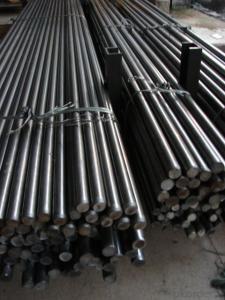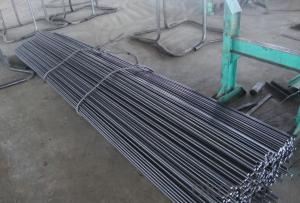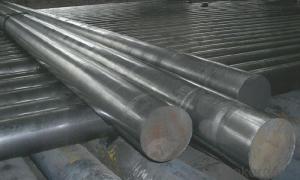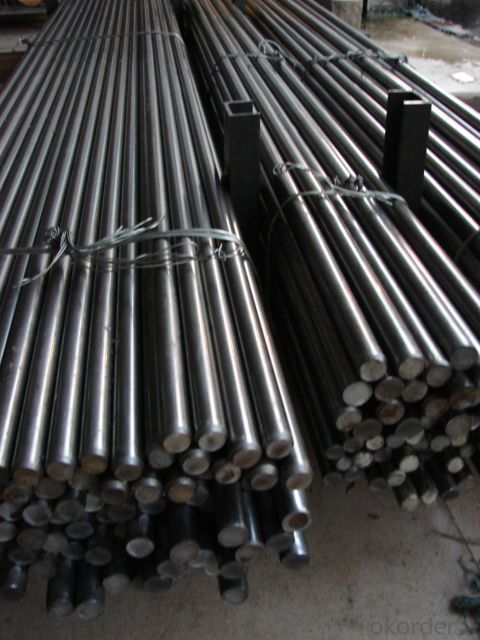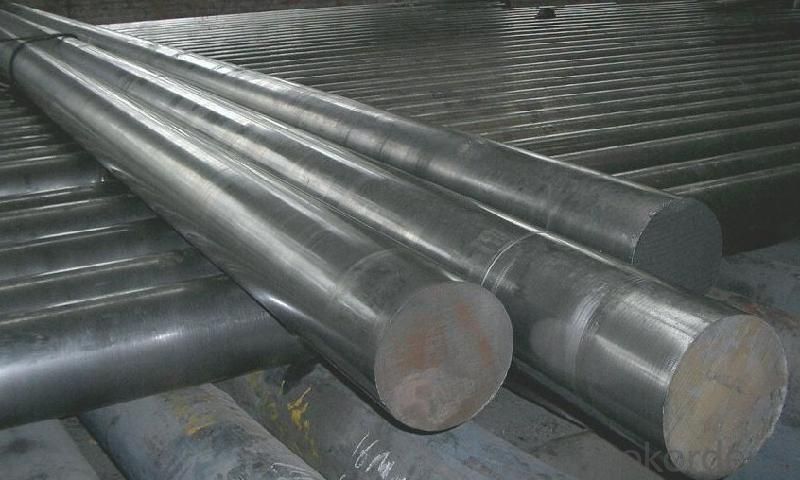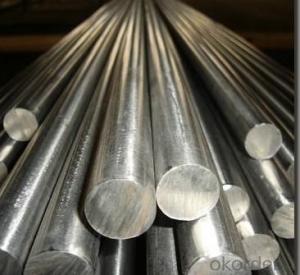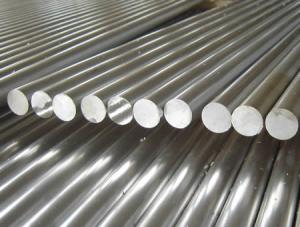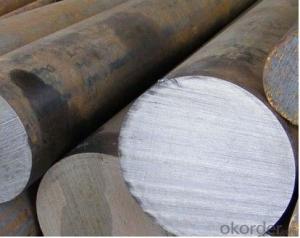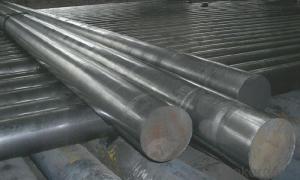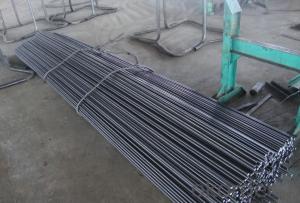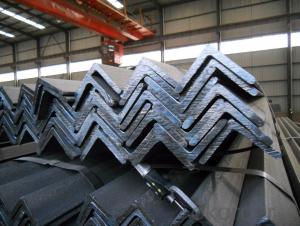Cold Drawn Steel Round Bar with High Quality-75mm
- Loading Port:
- China Main Port
- Payment Terms:
- TT or LC
- Min Order Qty:
- 100 m.t
- Supply Capability:
- 10000 m.t/month
OKorder Service Pledge
OKorder Financial Service
You Might Also Like
Cold Drawn Steel Round Bar with High Quality-75mm
Product Description:
Specifications:
1.Size: 75mm
2.Material: AISI 1045/DIN 1.1191/JIS S45C/GB 45
3.Chemical analysis:
C | Si | Mn | P≤ | S≤ | Cr |
0.40~0.60 | 0.20~0.30 | 0.70~0.90 | 0.030 | 0.030 | 0.01~0.03 |
4.Process: EAF + LF + VD + Forged + Heat Treatment (optional)
5.Delivery condition:Hot forged +Rough machined (black surface after Q/T)+ Turned (optional)
6.Technical Data: Chemical Composition, Physical Properties and Mechanical Testing.
7. Test: Ultrasonic test according to SEP 1921-84 3C/c.
8. Standard: GB, AISI, ASTM, DIN, JIS, BS, etc.
9. Quality Management Certification: ISO 9001:2008.
10. Main application:
(1)It is widely used in machinery manufacturing.
(2) For the manufacture of high strength requirements parts, such as gears, shafts, piston pin and the uneven force big machining parts, forgings, stampings and bolts, nuts, pipe joint.
FAQ of Cold Drawn Steel Round Bar with High Quality-75mm:
Q1: How soon can we receive the product after purchasement?
A1: Within three days of placing an order, we will begin production. The specific shipping date is dependent upon international and government factors, but is typically one month.
Q2: How do you guarantee the quality of our products?
A2: We have established an advanced quality management system which conducts strict quality tests at every step, from raw materials to the final product. At the same time, we provide extensive follow-up service assurances as required.
Q3: The prices are invoicing on theoritical weight or on actual weight?
A3: We can do it in both manners, according to the customers' request.
Images of Cold Drawn Steel Round Bar with High Quality-75mm:
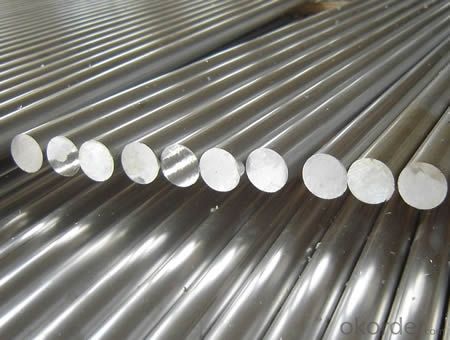
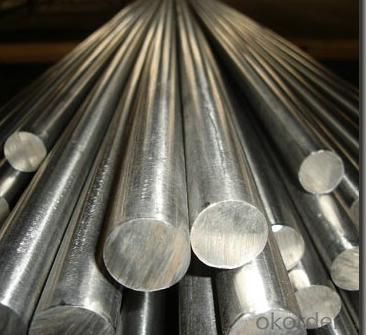
- Q: What are the different types of corrosion-resistant steel round bars?
- There are several types of corrosion-resistant steel round bars available in the market, including stainless steel round bars (such as austenitic, ferritic, and martensitic stainless steel), duplex stainless steel round bars, and precipitation-hardening stainless steel round bars. These different types of steel round bars offer varying levels of corrosion resistance, strength, and other properties to suit different applications and environments.
- Q: What are the different types of steel used in round bars?
- Round bars are produced using various types of steel. The most common options are as follows: 1. Carbon Steel: This basic steel variant contains a low carbon content (typically less than 1%) and is recognized for its robustness and durability. Carbon steel is often utilized in construction and structural projects. 2. Alloy Steel: By introducing elements like manganese, chromium, or nickel to carbon steel, alloy steel is created. These additives enhance the steel's strength, hardness, and ability to resist corrosion. Machinery and automotive components frequently employ alloy steel round bars. 3. Stainless Steel: Stainless steel is composed of at least 10.5% chromium by mass. This high chromium content grants stainless steel its distinctive properties, including corrosion resistance and a shiny appearance. Stainless steel round bars find wide applications in the food industry, construction, and in environments requiring high corrosion resistance. 4. Tool Steel: Designed to endure high temperatures and resist wear and tear, tool steel is a specialized steel type. It is commonly employed in the production of tools, dies, and in settings necessitating exceptional strength and hardness. 5. Duplex Stainless Steel: This stainless steel variant combines austenite and ferrite phases in its microstructure. As a result, it possesses superior strength and corrosion resistance compared to regular stainless steel. Duplex stainless steel round bars are frequently utilized in marine and chemical industries. In summary, the selection of steel for round bars is contingent upon specific requirements such as strength, corrosion resistance, and temperature resistance, depending on the intended application.
- Q: Are steel round bars suitable for the production of crankshafts?
- Indeed, steel round bars serve as a fitting choice for the fabrication of crankshafts. Due to their remarkable strength and durability, steel round bars find extensive use in the manufacturing process of crankshafts. The demanding conditions encountered by crankshafts during engine operation necessitate their ability to endure substantial stress and load. In this regard, steel round bars possess the essential mechanical properties to withstand such circumstances. The desired shape and dimensions required for crankshaft production can be achieved by either forging or machining steel round bars. Notably, steel showcases exceptional resistance to fatigue, a critical characteristic for crankshafts as they undergo cyclic loading. Consequently, steel round bars have garnered recognition as a suitable and universally embraced material for crankshaft production across diverse industries, including automotive and engineering.
- Q: How are steel round bars used in the construction of dams and reservoirs?
- Steel round bars are commonly used in the construction of dams and reservoirs for reinforcement purposes. These bars are typically embedded within the concrete structures to enhance their strength and durability. The steel round bars act as a framework, providing structural integrity and preventing cracks or deformations in the concrete. This reinforcement ensures that the dam or reservoir can withstand the immense pressure and load exerted by the water, making them an essential component in the construction process.
- Q: What are the advantages of using silicon-alloy steel round bars?
- There are several advantages to using silicon-alloy steel round bars. Firstly, silicon-alloy steel has excellent strength and durability. It is known for its high tensile strength, which makes it suitable for applications that require heavy-duty performance. This strength also allows it to withstand heavy loads and resist deformation, making it a reliable choice for various mechanical and structural purposes. Secondly, silicon-alloy steel round bars have good heat resistance. The presence of silicon in the alloy improves its ability to handle high temperatures without losing its structural integrity. This makes it ideal for applications that involve exposure to extreme heat, such as in furnace components, exhaust systems, or high-temperature equipment. Additionally, silicon-alloy steel round bars offer excellent corrosion resistance. The alloying elements in silicon-alloy steel, such as chromium and nickel, help create a protective oxide layer on the surface, preventing the metal from corroding and prolonging its lifespan. This makes it suitable for use in marine environments or corrosive atmospheres. Furthermore, silicon-alloy steel round bars have good machinability and weldability. This means that they can be easily formed into various shapes and sizes, making them versatile for different manufacturing processes. The ability to weld silicon-alloy steel allows for easy fabrication and customization, making it a convenient choice for many industries. Lastly, silicon-alloy steel round bars are cost-effective. Compared to other high-performance alloys, silicon-alloy steel is relatively more affordable, making it a cost-effective option for applications that require strength, durability, and resistance to heat and corrosion. In conclusion, the advantages of using silicon-alloy steel round bars include excellent strength and durability, good heat resistance, corrosion resistance, machinability, weldability, and cost-effectiveness. These qualities make silicon-alloy steel a versatile and reliable material for various industrial applications.
- Q: What are the advantages of using alloy steel round bars?
- There are several advantages of using alloy steel round bars. Firstly, alloy steel has superior strength and hardness compared to regular steel, making it more durable and resistant to wear and tear. Secondly, alloy steel round bars offer excellent corrosion resistance, making them suitable for use in various environments, including marine and chemical industries. Additionally, alloy steel can withstand high temperatures, making it ideal for applications that involve heat or extreme conditions. Lastly, alloy steel round bars can be easily machined and fabricated, allowing for versatility in design and customizations.
- Q: How do steel round bars compare to fiberglass or composite bars?
- Steel round bars and fiberglass or composite bars have distinct differences in terms of their properties and applications. Strength and Durability: Steel round bars are known for their exceptional strength and durability. They have a high tensile strength and can withstand heavy loads and stress. Fiberglass or composite bars, on the other hand, have good strength-to-weight ratio but are generally not as strong as steel bars. They may be more prone to bending or breaking under high pressure or impact. Weight: Steel bars are significantly heavier than fiberglass or composite bars. This can be advantageous in certain applications where additional weight is desired for stability or to counteract external forces. However, in situations where weight reduction is crucial, such as in aerospace or automotive industries, fiberglass or composite bars are preferred due to their lightweight nature. Corrosion Resistance: Steel bars are susceptible to corrosion, especially when exposed to moisture or harsh environments. They require regular maintenance and protective coatings to prevent rusting. In contrast, fiberglass or composite bars are inherently corrosion-resistant, making them suitable for applications in marine or chemical industries where exposure to corrosive elements is common. Electrical Conductivity: Steel round bars are conductive, which can be advantageous in certain applications where electrical grounding or conductivity is required. Fiberglass or composite bars, being non-conductive, are preferred in situations where electrical insulation is necessary, such as in electrical installations or sensitive electronic systems. Cost: Steel bars are generally more cost-effective compared to fiberglass or composite bars. The raw materials for steel production are widely available, making them more affordable in most cases. Fiberglass or composite bars, on the other hand, involve complex manufacturing processes and the use of specialized materials, leading to higher production costs. In summary, steel round bars are favored for their strength, durability, and cost-effectiveness. They are commonly used in construction, manufacturing, and infrastructure projects. Fiberglass or composite bars, on the other hand, offer advantages in terms of weight reduction, corrosion resistance, electrical insulation, and are frequently used in applications requiring these properties. The choice between the two depends on the specific requirements and conditions of the project or industry.
- Q: Can steel round bars be recycled?
- Yes, steel round bars can be recycled. Steel is a highly recyclable material, and the recycling process involves melting the steel bars down to be used in the production of new steel products.
- Q: Can steel round bars be used for making automotive suspension systems?
- Yes, steel round bars can be used for making automotive suspension systems. Steel round bars offer several advantages that make them suitable for this application. Firstly, steel is known for its high strength and durability, which are essential qualities for suspension components that need to withstand heavy loads and constant vibrations. Steel round bars also provide excellent stiffness and rigidity, allowing them to maintain the desired shape and function under various driving conditions. Furthermore, steel is readily available and cost-effective, making it a popular choice for automotive manufacturers. Additionally, steel round bars can be easily machined and formed into complex shapes, enabling the production of suspension components with precise dimensions and specifications. Overall, steel round bars are a reliable and practical material for making automotive suspension systems.
- Q: Can steel round bars be used for making mining equipment?
- Certainly! Mining equipment can indeed be made using steel round bars. These bars, owing to their exceptional strength, durability, and resistance to wear and tear, are widely utilized in the manufacturing process of various mining equipment. They are particularly suitable for applications that demand robust and heavy-duty machinery, such as drilling rigs, excavators, crushers, and conveyor systems employed in the mining industry. The adaptability of steel round bars enables them to be machined, welded, and shaped into diverse forms and sizes, thus facilitating the customization of mining equipment to cater to specific requirements. Moreover, steel round bars exhibit remarkable resilience in mining environments, enduring exposure to abrasive substances, extreme temperatures, and substantial loads.
Send your message to us
Cold Drawn Steel Round Bar with High Quality-75mm
- Loading Port:
- China Main Port
- Payment Terms:
- TT or LC
- Min Order Qty:
- 100 m.t
- Supply Capability:
- 10000 m.t/month
OKorder Service Pledge
OKorder Financial Service
Similar products
Hot products
Hot Searches
Related keywords
